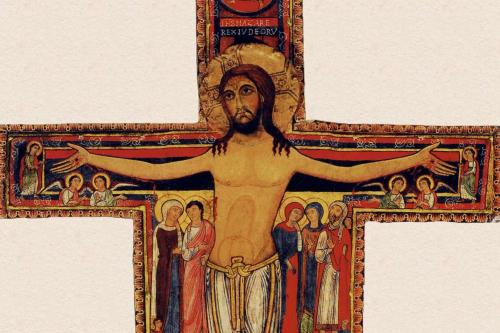Holy Week: meditation on Holy Saturday
The evening had come, since it was Parascève, that is, on the eve of the Sabbath, Giuseppe d'Arimatèa, an authoritative member of the Sanhedrin, who also waited for the kingdom of God, courageously went to Pilate and asked for the body of Jesus. Pilate he marveled that he was already dead and, called the centurion, asked him if he had long since died. Informed by the centurion, he granted the body to Joseph. Then, having bought a sheet, he placed it on the cross, wrapped it with the sheet and placed it in a sepulcher dug in the rock. Then he rolled a stone at the entrance to the tomb. Mary of Magdala and Mary the mother of Ioses were watching where it was placed.
The thoughts are never too many, nor the cautions, when one is not sure that what we have done is according to justice. But ridicule is immediately achieved if fear alone regulates us. However, it is never the humble who fall into it, not having many interests to protect nor much variety of means at their disposal. In general, the poor act in the open and risk jail and even something more personally, while others put those who have nothing to do with it at risk. That group of guards, who serve the temple, and who are sent by the priests to look at the tomb of the Golgotha Crucifix, had nothing to do with the interests of their masters. If anything, they had an interest that that dead man was indeed the Messiah and that he would really rise, as he said, for the salvation of Israel. Didn't they also need to be freed? The prosecutor Pontius Pilate, skeptical as long as you want, but not without common sense, extremely annoyed with all that business that threatens to drag on even after the protagonist's death, washes his hands this time, inaugurating the word: "get by". “You have a guard, go: make sure
as you think ". With the dead, Rome does not fight. “Deourm Manium jura sancta sunto”. But I am interested in the fate of that group of guardians of a sealed tomb, and in their spirit, both in serving and in bearing witness, not according to the facts they had seen, but according to the interpretation of their masters. The women, who were the last to leave the tomb, cross with the picket that goes up there and that for two nights and a day will stand guard at the tomb of the Nazarene. His kingship was unwittingly proclaimed by his own enemies, as was his power, which could not "be corrupted in the burial." Providence even uses our fear to increase the homages and testimonies to the Living One. It is still the women, "who on the dawn of Saturday night", while returning to "visit the tomb", meet with "some of the guard who came to the city to report to the chief priests all the things that had happened" . What had happened a few hours before, no human force could prevent it, because the impetus of Life is divine and the Risen One is now beyond all human control. How much humiliation, however, for the "elderly", who see themselves blatantly denied by the fact and judged by their subordinates! Sometimes, we wonder, with astonishment, how the sense of authority is lost, even in humble people. But thus, exercising it badly, because no one is so stupid as not to understand the unreasonableness of certain provisions. The guards of the tomb, even before seeing the tomb open, had the impression of being at the service of a finite cause. But the Sanhedrin does not worry about this: it is urgent to ensure the silence of the people who have seen what they should not have seen. In the council of the "elders", it was decided to buy their silence. In less graceful times and with less scrupulous men, the cutting of the head would have been quicker and safer. Instead, they put their hand to the bag. … They believe in money. Hadn't it gone well with Judas? But the silence of the guards is not enough. It takes a tame version of the event. And it is found on the spot: "Say like this:> ". In addition, the guarantee of impunity: "And if it ever comes to the ears of the governor, we will persuade him and we will put you out of trouble". Counterfeiters always, counterfeiters everywhere: and everywhere poor people who take money and make according to the instructions received. But was there no conversation between the angels and the guards? No word of the Risen One to these poor guardians of his glorious tomb? To calm my heart full of sadness, I need to imagine someone on their knees, in the blazing light of Easter. One cannot be witnesses, even if involuntary, to the greatest fact in history, without one carrying the vocation to faith in one's heart.
